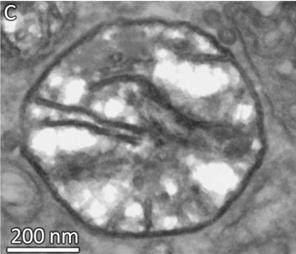As it evolved, the animal, a myxozoan relative of jellyfish and corals, gave up breathing and consuming oxygen to produce energy.
Aerobic respiration is a major source of energy but organisms like fungi, amoebas or ciliate lineages in anaerobic environments have lost the ability to breathe over time. This is the first discovery of an animal that gave up this critical pathway, possibly because the parasite happens to live in an anaerobic environment.

TEM image of H. salminicola mitochondrion-related organelle with few cristae.
Its genome was sequenced, along with those of other myxozoan fish parasites, but the parasite's anaerobic nature was an accidental discovery. While assembling the Henneguya genome, Professor Dorothee Huchon of Tel Aviv University found that it did not include a mitochondrial genome. The mitochondria is the powerhouse of the cell where oxygen is captured to make energy, so its absence indicated that the animal was not breathing oxygen.
Until the new discovery, there was debate regarding the possibility that organisms belonging to the animal kingdom could survive in anaerobic environments. The assumption that all animals are breathing oxygen was based, among other things, on the fact that animals are multicellular, highly developed organisms, which first appeared on Earth when oxygen levels rose.
"It's not yet clear to us how the parasite generates energy," Huchon says. "It may be drawing it from the surrounding fish cells, or it may have a different type of respiration such as oxygen-free breathing, which typically characterizes anaerobic non-animal organisms.
"It is generally thought that during evolution, organisms become more and more complex, and that simple single-celled or few-celled organisms are the ancestors of complex organisms," she concludes. "But here, right before us, is an animal whose evolutionary process is the opposite. Living in an oxygen-free environment, it has shed unnecessary genes responsible for aerobic respiration and become an even simpler organism."




Comments